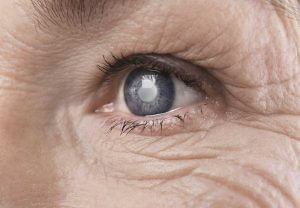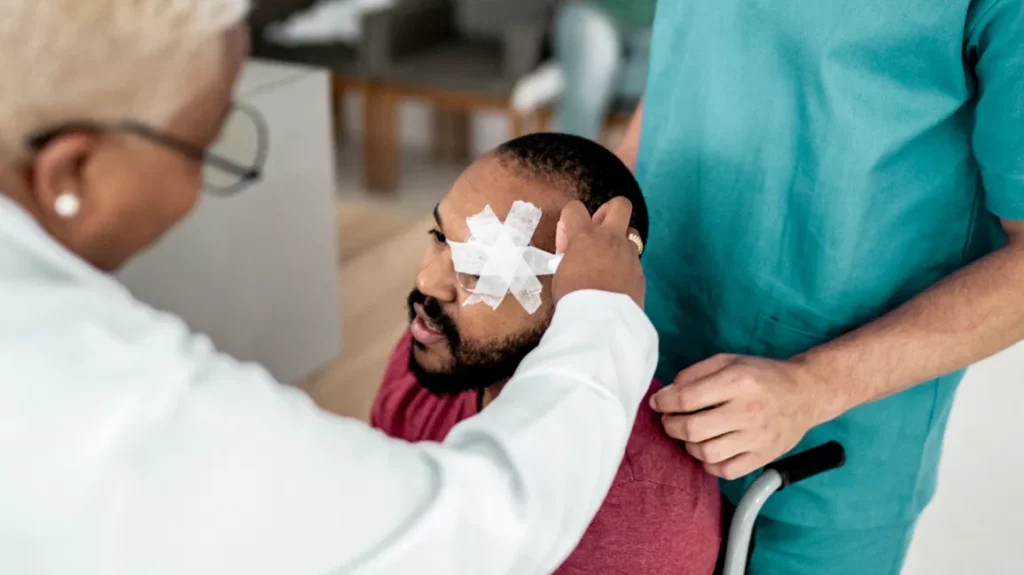Keyhole cataract surgery is a relatively new technique that is growing in popularity. This type of surgery is performed through a small incision in the eye, rather than the traditional method of making a large incision on the front of the eye. This surgical approach has many benefits, including reduced recovery time and less scarring. In this blog post, we will discuss the basics of keyhole cataract surgery and how it can benefit you or your loved one.
Contents
What is Keyhole Cataract Surgery?
 Keyhole cataract surgery is a type of cataract surgery that involves making small incisions in the eye, instead of larger ones. It is also known as “micro-incisional” or “phacoemulsification” cataract surgery, and it is designed to reduce trauma to the eye during the procedure.
Keyhole cataract surgery is a type of cataract surgery that involves making small incisions in the eye, instead of larger ones. It is also known as “micro-incisional” or “phacoemulsification” cataract surgery, and it is designed to reduce trauma to the eye during the procedure.
The goal of keyhole cataract surgery is to remove the cloudy lens, called a cataract, and replace it with an artificial intraocular lens (IOL). The IOL helps restore vision lost due to the cataract. This surgery is often considered a safe and effective way to treat cataracts.
How Is It Performed?
A keyhole cataract surgery procedure typically takes 45 minutes to an hour. During the procedure, the surgeon will make a small incision in the eye, usually less than 2 millimeters long. Then they will use a device called a phacoemulsification probe to break up and suction out the cloudy lens.
Finally, the surgeon will insert an artificial intraocular (IOL) lens into the eye to replace the cloudy lens. The incision is usually self-sealing, so there’s no need for stitches or further treatment.
The process is much faster and less invasive than other types of cataract surgery. It also causes less trauma to the eye and significantly reduces recovery time. If you are a suitable candidate for the procedure, you should be able to get back to your regular activities within a few days.
Who Is A Good Candidate For Keyhole Cataract Surgery?
Usually, the cataract surgery types are many and a patient needs to consult an ophthalmologist to understand which one is suitable for them. A good candidate for keyhole cataract surgery has a clear diagnosis of a cataract, as well as no other eye-related issues.
Also, age can be a factor in determining the suitability of this kind of procedure – generally, those who are over 50 and have a stable eye condition are the best candidates. Other criteria that can affect the suitability of a patient for keyhole cataract surgery include:
- History of glaucoma
- History of retinal detachment
- Previous eye surgery
- Active eye infection
- Diabetes or other systemic conditions that affect the eyes
These things might affect your candidacy for keyhole cataract surgery. Your doctor will be able to assess your eye health and make the best recommendation regarding which type of procedure is best suited for you.
How Painful Is Keyhole Surgery?
 While it may sound scary at first, keyhole cataract surgery is actually a relatively painless procedure. The numbing eye drops and injections used to numb the eye are the most uncomfortable part of the operation, but even then, it’s nothing more than a slight pressure sensation.
While it may sound scary at first, keyhole cataract surgery is actually a relatively painless procedure. The numbing eye drops and injections used to numb the eye are the most uncomfortable part of the operation, but even then, it’s nothing more than a slight pressure sensation.
Once you get past that step, the actual surgery itself usually isn’t painful at all. The surgeon makes a tiny incision in the eye, then inserts the cataract removal instruments through that opening. This is done with utmost precision and care to make sure your eyes remain safe throughout the entire process.
So, you can rest assured that the procedure is more than manageable and won’t cause you any significant discomfort.
Benefits Of Keyhole Cataract Surgery
There are many advantages to opting for keyhole cataract surgery over traditional methods. The most notable benefits include:
- Shorter recovery time: It is not uncommon for patients to return home just a few hours after their procedure.
- Less invasive: Keyhole cataract surgery requires no large incision, significantly reducing the risk of complications.
- Less discomfort: Unlike traditional methods, keyhole cataract surgery requires only a tiny incision and typically causes minimal discomfort and pain.
- Improved vision: Patients can typically enjoy improved vision shortly after their procedure, with few or no post-operative visual side effects.
- A smaller amount of intraocular pressure (IOP): Finally, it is important to note that keyhole cataract surgery does not disturb the vitreous humor, meaning the IOP is kept at a safe level.
In addition, patients can usually resume activities such as reading and driving within two days after the procedure. This is an advantage over traditional methods, which may require weeks of recuperation before normal activities can be resumed.
Risks And Complications
Though it is a relatively safe and low-risk procedure, there are some risks associated with keyhole cataract surgery. These include:
- Infection: This is one of the most common risks associated with all types of surgery, including keyhole cataract surgery.
- Inflammation: It is not uncommon for the eye to become inflamed after this type of surgery. This can be treated with medications.
- Corneal swelling or edema: This is a rare complication that can occur after keyhole cataract surgery, resulting in blurred vision or even blindness.
- Iris or corneal damage: Depending on the type of surgery being performed, there is a risk that the iris or cornea could be damaged.
- Cataract regrowth: In some cases, the cataract can recur after surgery.
- Glaucoma: there is a risk of glaucoma developing after the surgery.
- Retinal detachment: As with other types of eye surgery, there is a small risk of retinal detachment occurring.
- Vitreous hemorrhage: There is a small risk of bleeding in the vitreous humor, which can cause vision loss if not treated promptly.
- Visual disturbances: Disorientation and distortions in vision can occur after the surgery, although this is rare.
The best way to minimize your risk of complications is to choose an experienced ophthalmologist who has experience in performing this type of surgery. Your ophthalmologist should also be able to explain what you can expect during the procedure and aftercare process. Additionally, it is important to follow all pre-and post-operative instructions carefully in order to limit any potential risks or complications.
Recovery Time
 While keyhole cataract surgery is an outpatient procedure and most patients can go home the same day, it’s important to note that recovery time may vary from patient to patient. Most people will experience some degree of discomfort and sensitivity afterward, so your doctor may recommend medications for pain relief.
While keyhole cataract surgery is an outpatient procedure and most patients can go home the same day, it’s important to note that recovery time may vary from patient to patient. Most people will experience some degree of discomfort and sensitivity afterward, so your doctor may recommend medications for pain relief.
The overall recovery time can be anywhere from a few days to several weeks, and your doctor will provide specific instructions for caring for the eye and healing properly. This could include:
- Wearing glasses or sunglasses at all times
- Avoiding strenuous activities such as lifting heavy objects or engaging in contact sports.
- Follow-up appointments to ensure the healing process is progressing as normal
- Using eye drops to help with dryness or inflammation
Therefore, if you’re considering keyhole cataract surgery, it’s important to plan for adequate recovery time and ensure you have enough help or assistance during that period. It’s also essential to discuss all the potential risks, benefits, and expectations with your doctor before making a decision.
Doing so can ensure that the procedure goes as smoothly as possible and that you make the right decision for your individual needs. With the right preparation and care, you can look forward to a successful outcome.
Conclusion
In conclusion, keyhole cataract surgery is a minimally invasive, low-risk procedure that can effectively treat cataracts. The procedure is relatively fast and can provide improved vision without the need for glasses or contact lenses in most cases. The success rate of this type of surgery is very high, making it a popular choice among those suffering from cataracts.
Patients should consult with their ophthalmologists to discuss the risks and benefits associated with this or any other procedure before undergoing this type of surgery. With proper preparation and care, this operation can lead to excellent results and improved vision.
Cataract surgery is a safe and painless procedure. At MantraCare we have a team of experienced eye surgeons, who will be happy to answer any questions on cataract surgery. Call us at +91-9711116605 for any inquiries.
